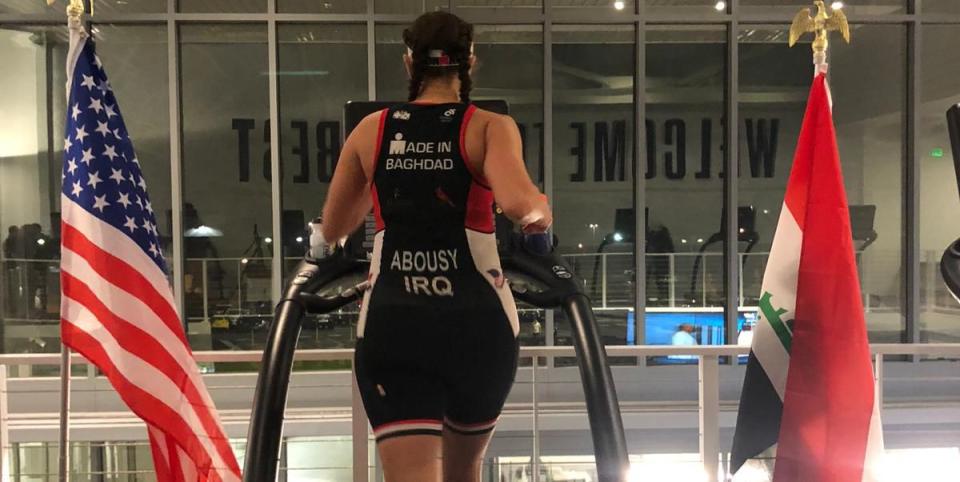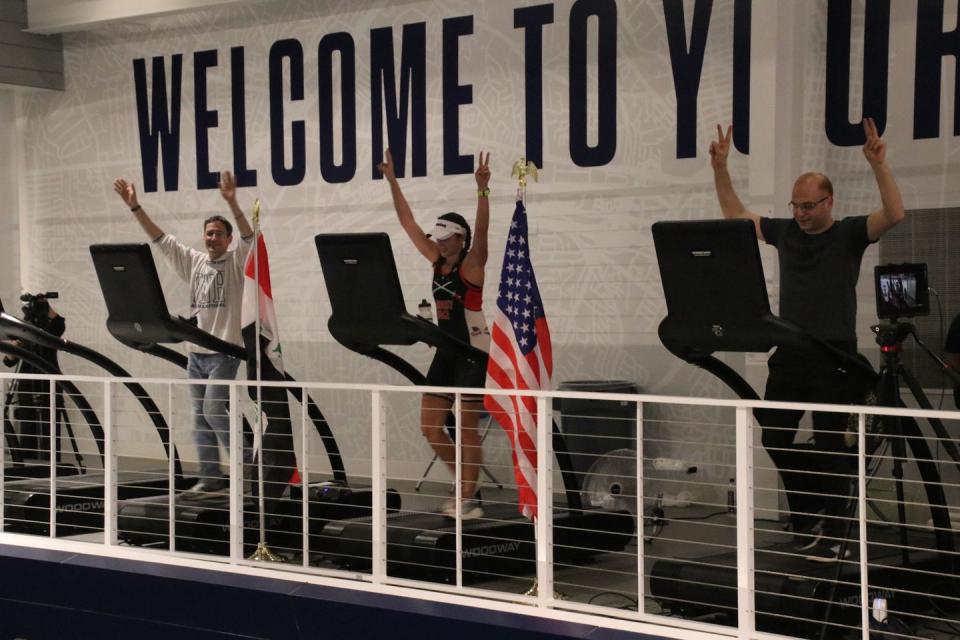This runner finished an Ironman-distance triathlon, completely indoors

After swimming 80 lengths in an Olympic-distance pool, and pedalling 112 miles on a stationary bike, Mais Abousy stepped onto the treadmill at The St. James Sports Complex in Virginia. It had been eight hours since the Iraqi-American first embarked on her journey to finish an indoor Ironman-distance triathlon, and the most gruelling part—the marathon—was just beginning.
For the first five miles of the run, Abousy couldn’t feel her right foot. The rest of her body wasn’t faring well either. A friend who had come to cheer her on said Abousy looked 'like death.' Between miles 13 and 16, Abousy felt so nauseous that supporters placed a trash can alongside the treadmill. And when she paused for bathroom breaks, dizziness nearly overtook her.
'But there was no way in my mind was I going to quit,' Abousy told Runner’s World.
Instead, the 39-year-old focused on the notes of encouragement that her 13-year-old daughter, Meena, had written on a stack of post-its placed on the treadmill. Abousy ripped off a new note every mile, revealing phrases like 'Go, mama, go,''There’s wine at the end,' 'Don’t fart,' and 'You can do this.' In the end, those words were all Abousy needed.
At 8:06 p.m., flanked by an American flag on her left and an Iraqi flag on her right, Abousy took her final strides, flung her arms into the air, and broke into a wide grin. She’d just become the first known woman to unofficially complete an indoor Ironman-distance triathlon. More importantly, though, she’d proved to herself that she possessed the fortitude necessary to achieve her ultimate goal: complete a self-supported Ironman-distance event in her home country, Iraq.
'She’s determined,' Abousy’s coach Alan Gulledge said when asked to describe her as an athlete. 'She’s going to get it done. Come hell or high water, she’s gonna do it.'
To understand Abousy’s relentless drive, it helps to understand where she came from. Abousy moved to the U.S. in 1991 when her family took one of the last planes out of Baghdad during the first Gulf War. On her first day of school in Greensburg, Pennsylvania, Abousy, then 10, remembers a classmate’s parent—an American soldier who had fought in the Gulf War—coming in and discussing his experiences overseas.

'He was talking about how he killed the "bad guys," and he was showing them our money—like the Iraqi money,' Abousy remembered. The encounter made her realise that if she was going to live in the U.S. and become an American, she would also need to be a good ambassador for Iraq. 'I knew right there and then that the Iraqi flag is something that needs to be shown and represented in the best light because otherwise, we’re just the bad guys.'
It would take more than two decades, though, for Abousy to connect that mission to running. For many years, Abousy says the concept of running for sport never made sense to her. As a Middle Easterner, 'you don't usually run for fun,' she explained, 'you run from something.'
When she moved to the Washington D.C. area for law school and noticed lots of people seemingly lacing up for pleasure, she felt compelled to try the activity herself in an attempt to understand the hoopla. Abousy ran a couple miles here and there, but didn’t fully connect with the sport until the government shutdown in 2013, when her husband suggested she release pent-up work frustration by going on a run. With little running knowledge or experience, Abousy, an attorney for the Department of Commerce, laced up and ran to Ronald Reagan Washington National Airport and back, a distance of 10 miles. Her work stress melted—and she was hooked.
The next year, Abousy ran the 2014 Chicago Marathon, during which she noticed around mile 12 a huge Palestinian flag billowing and spectators clapping for Palestinian runners. The show of support made Abousy realize that running is a sport where “anyone can wear whatever flag they want to wear, and everyone will be seen, and everyone will be respected.”
With that ethos, she vowed to return to the race the following year, run with the Iraqi flag, and use the opportunity to raise money for the Iraqi Children Foundation, which helps children who are vulnerable to abuse, neglect, and exploitation. Abousy fulfilled that goal at the 2015 Chicago Marathon, and she’s continued the tradition nearly 20 times since at various running races and triathlon events.

'I just constantly feel like I owe the rest of the people that we left behind [in Iraq],' explained Abousy, who estimates she’s raised at least $30,000 for the Iraqi Children Foundation to date. 'We got such a golden opportunity to live our lives, and they didn't...so I owe it to them to extend a hand of help.'
She recalls an especially poignant moment from the 2017 Miami Half Ironman, when she removed the Iraqi flag out of her back pocket and flung it up in the air as she ran the final stretch of the race.
'People [were] watching trying to find out what flag is that? Where is she from? Why is she so proud of that?' she remembered. 'And just if someone can ask those questions subconsciously in their head, I feel like I’ve done my job.'
When COVID-19 cancelled the races Abousy had planned for 2020, she realised she didn’t need an official event in order to achieve her goals. With that mindset, she set her sights on completing the indoor Ironman-distance event.
Training for the feat involved lots of treadmill running as well as long hours in the garage on a stationary bike 'smelling my children’s hockey equipment,' Abousy recalled. The actual event, however, was fun, she insists. A dozen others—including several fellow Iraqi-Americans—swam, biked, and ran alongside Abousy in shifts. An Army veteran that had served in Iraq ran the entire marathon alongside her.
'Even though I wanted to throw up and I couldn’t feel my right foot for a while, I had the music cranking, I had my loved ones beside me who were cheering me on, and they made me feel powerful, important and, I don’t know, relevant,' Abousy reflects.
The last 10 minutes, in particular, were especially poignant. Abousy was joined by the Principal Deputy Assistant Secretary for Iraq on her right, and the Deputy Chief of Mission for the Iraqi Embassy on her left. 'For once, it was all my different lives merged in one,' Abousy said. 'I was no longer the Iraqi living in America, or the American who was Iraqi—I was just simply Iraqi-American.'

Abousy is now channeling her efforts towards preparing for the self-supported Ironman-distance event in Iraq, which she plans to attempt in early 2022. She’s already mapped out a possible route—from the swim in Habbaniyah Lake, where she used to play as a child, to the bike ride on the so-called 'Highway of Death,' to the marathon route that will weave through every district in Baghdad before finishing at Assassain’s Gate.
It won’t be easy—she’ll be biking on bombed-out roads, managing desert conditions, and contending with possible security threats. But 'easy' isn’t the point.
The ultimate goal, Abousy said, is to let 'the world see Iraqis for who they are now. The good part—not the bad.'
You Might Also Like

 Yahoo Finance
Yahoo Finance 